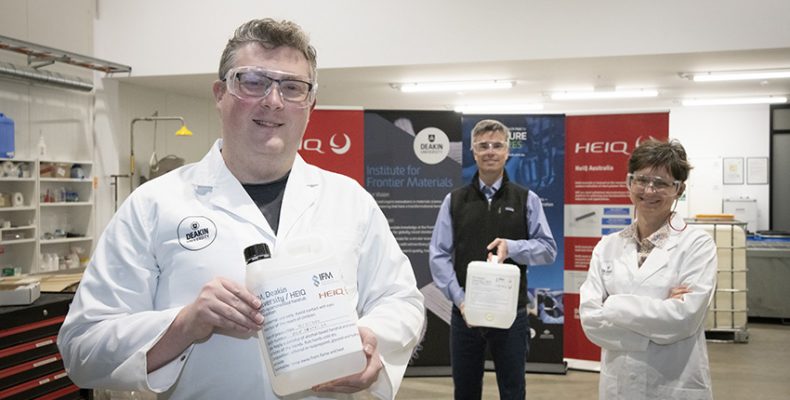Innovative textile technology business and member of the Advanced Fibre Cluster, HeiQ, has stepped up to help the fight against COVID-19 by supplying masks treated with its Viroblock Vesicle and Silver Technology, which promises to usher in a new era for fabrics which are coronavirus resistant.
Co-founder Murray Height, who is based at Deakin University in Waurn Ponds, Geelong, explains the firm has been shipping masks treated with the anti-viral and bacterial product, which was launched in March, and shipping them into different markets during the emergency period.
“We are in challenging times and the way we’ve approached it is that we just have to shift our business to help in whatever way we can and we’ve pivoted our business to focus on this topic as much as we can at this time,” Mr Height says.
The HeiQ Viroblock NPJ03 textile treatment combines silver antimicrobial technology and vesicle technology to rapidly destroy enveloped viruses, including coronaviruses. Testing indicated a virus reduction of over 99.9% relative to the control.
Mr Height says activity to address the pandemic will remain a large focus for HeiQ over the coming year and beyond.
“One thing the pandemic has shown us all is the importance of some of these characteristics of all these surfaces around us in our lives. All of a sudden we see textiles, we see surfaces on table tops – and wherever we interact with a surface we are now thinking about them completely differently in terms of viruses and bacteria.”
– Murray Height, HeiQ Co-Founder
A mask without any additional anti-viral capabilities can protect from aerosol spores but may not protect against touching the mask and then touching other surfaces. Putting that mask down on a surface “while you’re having coffee” and then picking it up and putting it back on can transfer the virus, Mr Height explains.
“One of the main values is helping reduce the potential for transmission from surfaces,” Mr Height says of the treated masks.
Founded in 2005 as a spin-off of Swiss Federal Institute of Technology Zurich, HeiQ counts Bonds, SKINS, Mammut and Hanes among 200 global textile brands it supplies to, particularly in sports and outdoor. Its unique processes add adaptive cooling, temperature and moisture management to everyday apparel, keeping the wearer cool and comfortable.
Carpets, home furnishings and uniforms are also supply areas for the business.
“Wherever there are textiles in need of greater functionality, that is really where we seek to position,” Mr Height says.
HeiQ has around 80 people at sites across Zurich, the US, China, Portugal and Taiwan. The Australian operation focuses on research and development and Mr Height and his business partner work with around eight researchers at Deakin’s Institute for Frontier Materials with this focus on chemical functionality applied to textiles.
“The role of our business here is very much toward the innovation pipeline for the global business and working with universities, in particular Deakin, is the key capability here and a very important aspect of what we do here.”
– Murray Height, HeiQ Co-Founder
“A lot of our role is really coming up with new technology, new ways to get things done, that ends up being implemented in the global textile supply chain,” Mr Height says.
“The things we work on here in Australia are very early stage. We are coming up with new concepts on a whole host of functionalities that we can eventually put on textiles.”
The technologies give different properties such as antimicrobial properties to reduce odour in activewear, or water repellent and cooling technologies for sports clothes.
HeiQ supplies textile makers with the chemistry that is then applied onto the surface. Mr Height says he is now looking to achieve more manufacturing locally in Australia, in particular for some of HeiQ’s specialised products.
This would help the global business manage supply chain challenges created by the pandemic.
“We can also have manufacturing here to support the global business. That’s something that we’re looking at. We think we can bring more activity here on some specialised products. For some of our treatments, in our new technology, that’s a possibility.”
– Murray Height, HeiQ Co-Founder
The team is also looking in depth at new starting materials such as Deakin’s short polymer fibres to build in the surface treatments for textiles, with a focus on natural bio-derived polymer types and on waste materials that might come from agricultural processing or food-processing, recycled textiles themselves, or other fibrous materials that have come from waste.
“A large focus of what we do is on those natural material types and how we can displace other types of materials that don’t have as good a sustainability profile,” Mr Height says.
“That’s a very important element to how technology needs to move into the textile market. All up and down through the market chain, that’s an increasing demand.”
Jul 2020
